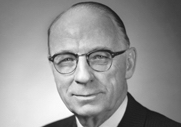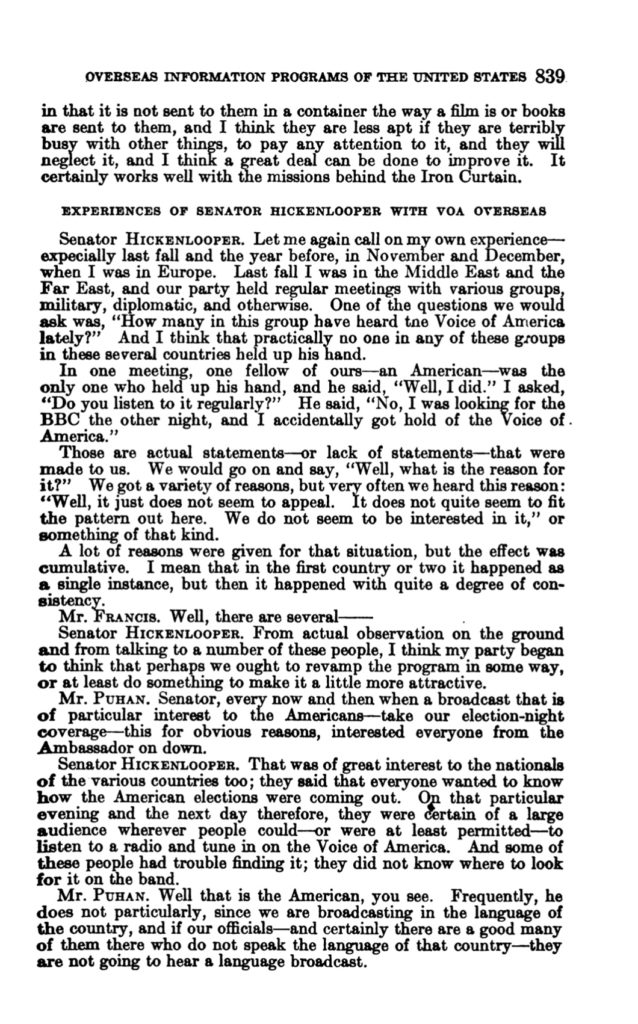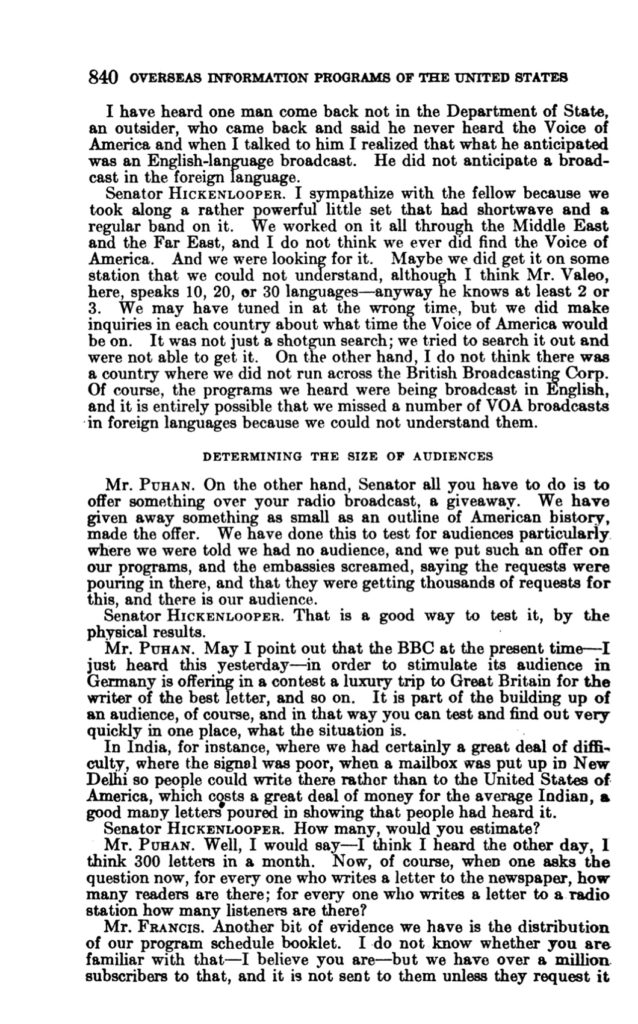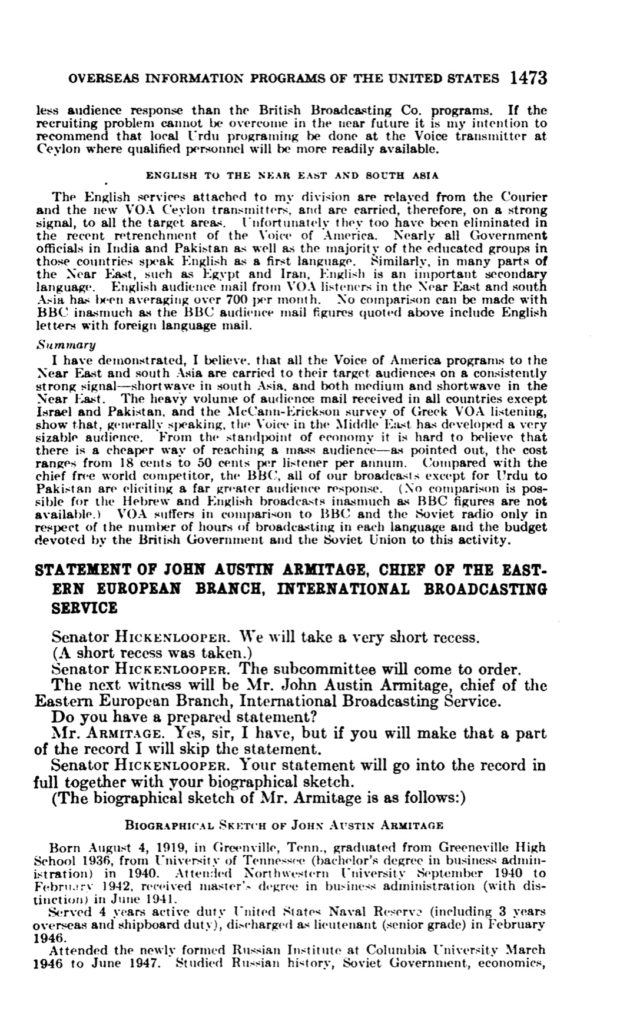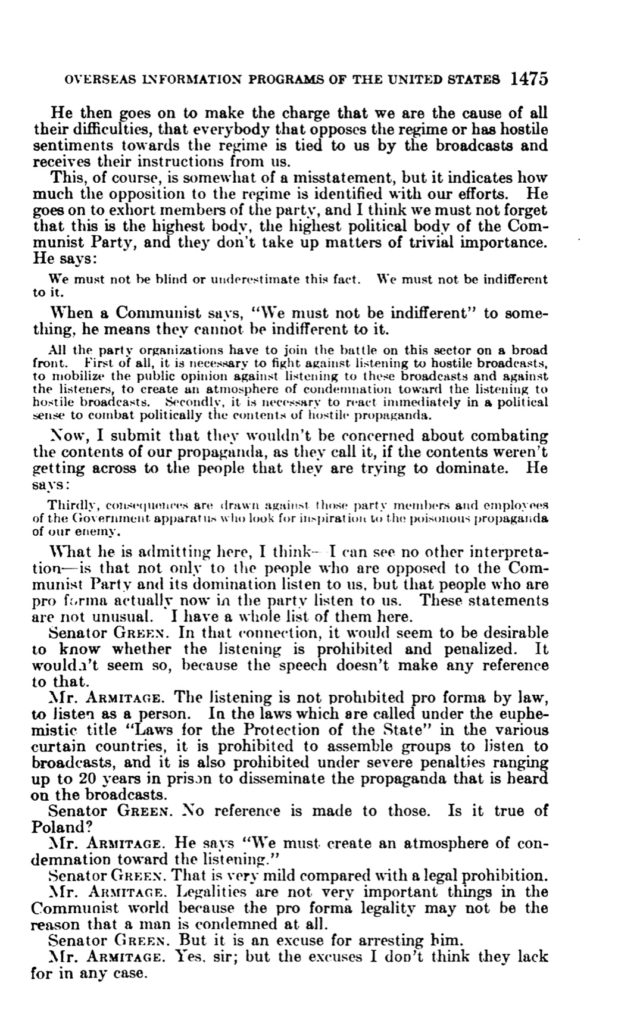At a hearing of the U.S. Senate Committee on Foreign Relations’ Subcommittee on Overseas Information Programs on April 20, 1953, Senator Bourke B. Hickenlooper (Republican-Iowa) noted the lack of audience for the Voice of America English-language broadcasts and various management and program delivery deficiencies. But the lawmaker who would become later the leading Republican on the Senate Foreign Relations Committee also noted improvements in the content of VOA broadcasts in foreign languages to countries behind the Iron Curtain.
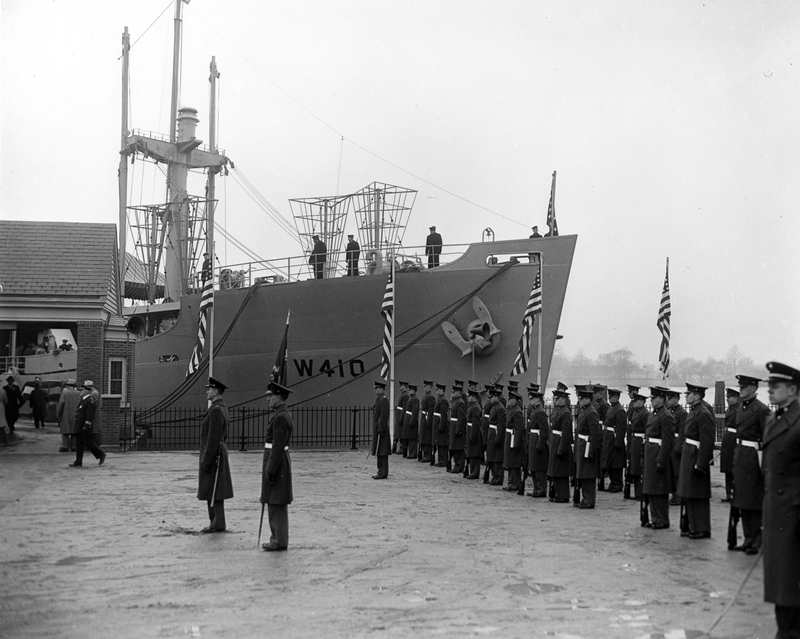
Changing Listener Views of VOA Programs
By 1952, pro-Soviet propagandists were long gone from the Voice of America and were replaced by anti-communist refugee journalists, although as late as 1951 listeners in Poland were still complaining in letters secretly sent to the United States that VOA Polish programs were “uninteresting, drab, bureaucratic in tone, unconvincing.”[ref]97 Cong. Rec. (Bound) – Volume 97, Part 7, July 24, 1951; 8749-8750.[/ref] One communist spy was discovered in 1953 working for the Voice of America bureau in Munich, West Germany, and doing minor freelance work for the Radio Free Europe Polish Service, also in Munich. The agent later escaped back to Poland. He had no editorial functions and no influence over programming policy at VOA or at RFE. Zbigniew Brydak, aka Stefan Michalski, is believed to be responsible for the deaths of several young men in Poland whom he denounced to the communist authorities. He tried but failed to secure a full-time position with Radio Free Europe’s Polish Service.[ref]Marek Walicki, Z Polski Ludowej do Wolnej Europy (Warszawa: Bellona Spółka Akcyjna, 2018), pp. 170-182.[/ref]
Senator Hickenlooper discovered on his travels abroad at the end of 1952 that, contrary to assertions of its officials, the Voice of America did not have a vast audience abroad for its English-language programs, especially in countries that already had some free media. He described his findings while questioning VOA officials on April 20, 1953.
EXPERIENCES OF SENATOR HICKENLOOPER WITH VOA OVERSEAS
Senator Hickenlooper. Let me again call on my own experience— especially last fall and the year before, in November and December, when I was in Europe. Last fall I was in the Middle East and the Far East, and our party held regular meetings with various groups, military, diplomatic, and otherwise. One of the questions we would ask was, “How many in this group have heard the Voice of America lately?” And I think that practically no one in any of these groups in these several countries held up his hand.
In one meeting, one fellow of ours—an American—was the only one who held up his hand, and he said, “Well, I did.” I asked, “Do you listen to it regularly?” He said, “No, I was looking for the BBC the other night, and I accidentally got hold of the Voice of. America.”
Those are actual statements—or lack of statements—that were made to us. We would go on and say, “Well, what is the reason for it?” We got a variety of reasons, but very often we heard this reason: “Well, it just does not seem to appeal. It does not quite seem to fit the pattern out here. We do not seem to be interested in it,” or something of that kind.
A lot of reasons were given for that situation, but the effect was cumulative. I mean that in the first country or two it happened as a single instance, but then it happened with quite a degree of consistency.
Mr. Francis. Well, there are several——
Senator Hickenlooper. From actual observation on the ground and from talking to a number of these people, I think my party began to think that perhaps we ought to revamp the program in some way, or at least do something to make it a little more attractive.
Mr. Puhan. Senator, every now and then when a broadcast that is of particular interest to the Americans—take our election-night coverage—this for obvious reasons, interested everyone from the Ambassador on down.
Senator Hickenlooper. That was of great interest to the nationals of the various countries too; they said that everyone wanted to know how the American elections were coming out. On that particular evening and the next day therefore, they were certain of a large audience wherever people could—or were at least permitted—to listen to a radio and tune in on the Voice of America. And some of these people had trouble finding it; they did not know where to look for it on the band.
Mr. Puhan. Well that is the American, you see. Frequently, he does not particularly, since we are broadcasting in the language of the country, and if our officials—and certainly there are a good many of them there who do not speak the language of that country—they are not going to hear a language broadcast. I have heard one man come back not in the Department of State, an outsider, who came back and said he never heard the Voice of America and when I talked to him I realized that what he anticipated was an English-language broadcast. He did not anticipate broadcasting the foreign language.
Senator Hickenlooper. I sympathize with the fellow because we took along a rather powerful little set that had shortwave and a regular band on it. We worked on it all through the Middle East and the Far East, and I do not think we ever did find the Voice of America. And we were looking for it. Maybe we did get it on some station that we could not understand, although I think Mr. Valeo, here, speaks 10, 20, or 30 languages—anyway he knows at least 2 or 3. We may have tuned in at the wrong time, but we did make inquiries in each country about what time the Voice of America would be on. It was not just a shotgun search; we tried to search it out and were not able to get it. On the other hand, I do not think there was a country where we did not run across the British Broadcasting Corp. Of course, the programs we heard were being broadcast in English, and it is entirely possible that we missed a number of VOA broadcasts in foreign languages because we could not understand them.
While in separate Senate subcommittee hearings in 1953, Senator McCarthy did not find any communists in any important positions at the Voice of America in New York or in Washington and made many exaggerated and outright false accusations, the Senate and House investigations of VOA produced some management reforms, resulted in better delivery of radio programs and gave more freedom to VOA journalists to expose and criticize human rights violations in the Soviet Union and in the Soviet Block countries as the Truman White House and the State Department began to change their information and public diplomacy strategy. There was a big difference in Voice of America programs between 1950 and 1953.
In a hearing on May 13, 1953, Voice of America official John Austin Armitage, a Foreign Service Officer who was Chief of the Eastern European Branch, gave Senator Hickenlooper a convincing example that VOA broadcasts to Poland have improved and were becoming more effective.
LETTER FROM ESCAPED POLISH PILOT
Senator Hickenlooper. Your statement, I notice, is just two pages long. You may read it.
Mr. Armitage. Well, sir, if I may. You have heard so much about our philosophy and approach I would like to skip over to some of the evidence of our effectiveness; in my statement there is a letter here which we received last Wednesday from the Polish pilot, Franticek [Franciszek] Jarecki, the fellow who flew that MIG across Poland into Denmark about 6 weeks ago. This was a purely unsolicited letter, I assure you, and came as a surprise:
I take advantage of my stay in America to write to the Polish Section of the Voice of America. I have often listened to the Voice of America in Poland, in spite of the fact that this was prohibited to us in the army and even though I knew that I would be subject to severe reprisals on the part of the superior Communist authorities, if I were caught listening. I wish to extend my thanks to the whole Polish Section of the Voice of America for their work. The people in Poland listen to you. They listen to you everywhere in the country, and they have great confidence in you. All in Poland, young and old, are thirsting for true information from America and about America. The people in Poland know that the Voice of America is the voice of the government of the most powerful republic in the world, the only country that Soviet Russia fears. Consequently, the people in Poland listen eagerly to this voice. I repeat that the people in Poland trust the Voice of America very much: they literally live by the broadcasts of the Voice of America, and they always discuss them extensively in their intimate circles. Nobody reads the regime press and nobody listens to the Warsaw radio. We only believe you. Your news, your commentaries, and your political satires reach millions of Polish listeners.[ref]United States. Congress. Senate. Committee on Foreign Relations. Subcommittee Under S. Res. 74 on Overseas Information Programs of the U.S. Overseas Information Programs of the U.S.: Hearings Before the United States Senate Committee On Foreign Relations, Subcommittee Under S. Res. 74 On Overseas Information Programs of the U.S., Eighty-Second Congress, Second Session. Washington: U.S. G.P.O., 1952. Page 1474. https://hdl.handle.net/2027/umn.31951d02094637q?urlappend=%3Bseq=1498.[/ref]
The escaping Polish pilot’s comments in 1953 that the people in Poland “literally live” by the broadcasts from the Voice of America reflected the change in VOA programming to Poland compared to the previous period and may have reflected the contributions of Polish journalists working for the VOA Munich Center, established in 1951, which specialized in interviewing refugees and tried to compete with Radio Free Europe. Alan Heil, a strong critic of Senator McCarthy, wrote in his Voice of America: A History book that “During its eight-year existence, the [VOA] Munich center at one time broadcast directly to Eastern Europe and the Soviet Union in more than a half dozen languages entirely independent of the U.S. headquarters operations.” Heil noted that “Its programming, in some instances, was even ‘harder line’ than that of the Voice at home.”[ref]Alan Heil, Voice of America: A History, (New York: Columbia University Press, 2003), 50.[/ref] As far as radio listeners behind the Iron Curtain were concerned, this was a good thing, but some VOA officials, managers, editors, and English newsroom journalists disagreed.


